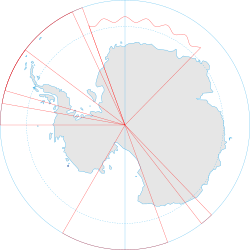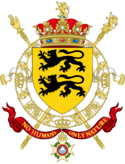Grand Duchy of Flandrensis
Grand Duchy of Flandrensis Groothertogdom Flandrensis (Dutch) | |
|---|---|
| Motto: "No humans, Only Nature", "Geen mensen, alleen de natuur" (Dutch) | |
| Anthem: Long live Flandrensis | |
 | |
| Official languages | Dutch (Belgian) |
| Demonym(s) | Flandriaan, Flandrensian |
| Government | Constitutional Monarchy |
• Grand Duke & Grand Duchess | Nicholas of Flandrensis & Delphine I |
| Legislature | Grand Ducal Cabinet |
| Establishment | 4 September 2008 |
| Area | |
• Total | 14,890 km2 (5,750 sq mi) |
| Population | |
• 2024 census | 1,000 |
| Currency | Flandri [1][2][3] |
| Time zone | (UTC -8) |
Website Official website | |
Flandrensis, officially the Grand Duchy of Flandrensis (Dutch: Groothertogdom Flandrensis), is a micronation with claims over some areas of Antarctica, which was founded in 2008 by the Belgian Nicholas de Mersch d'Oyenberghe. Flandrensis is currently not recognised by any government or country acknowledged by the United Nations.[1][2][3][4][5][6][7][8][9]
Since 2021 the micronation is registered in Belgium as the environmental non-profit organization “vzw Groothertogdom Flandrensis” [10] and is an accredited observer at the United Nations Environment Programme.
Etymology
The name is inspired on "Pagus Flandrensis," the oldest Latin name of Flanders (8th century) and means “overflow, flooding”.
History
The Grand Duchy of Flandrensis was founded on 4 September 2008 by the Belgian Nicholas de Merch d'Oyenberghe. The micronation is inspired by the medieval County of Flanders (Pagus Flandrensis).[1][2][3][4][5] Flandrensis was firstly regarded by the founder as a hobby-micronation, later as an ecological venture, to raise awareness on ice melting and climate change. And since 2021 the micronation is also an environmental non-profit organization.[10]
The micronation has its own identity cards, currency, newspaper, heraldry, constitution and national anthem. In 2012, Flandrensis was composed of 114 citizens from 21 different nationalities.,[3] in 2021 the micronation has 741 citizens from 71 nationalities.[9] Outside the internet, the activities of Flandrensis was mainly restricted to the region around Roeselare,[1][2][4][5] but the official embassy is located in the West-Flemish town Langemark.[3] Between 2010 and 2018 Flandrensis had also a Commonwealth that united only Dutch-speaking micronations for purposes of diplomacy: the Grand Duchy of Flandrensis, the Principality of Arkel, and the Duchy of Campinia (disbanded in 2016).[3]
Flandrensis has been mentioned in Belgian regional media outlets such as the Krant van West-Vlaanderen.[3][11] After the participation of Flandrensis in PoliNation 2012,[12] the Belgian newspapers Het Nieuwsblad,[4] Het Belang van Limburg[1] and Gazet van Antwerpen[2] published articles featuring Flandrensis as part of a report on European micronations. In 2014 the micronation was the theme of the television show "Normale Mensen" on the Belgian channel Één.
Later Flandrensis was also present on micronational conference or conventions in Perugia (Polination, 2015), Aigues-Mortes (OMF, 2016), Atlanta (MicroCon, 2017) and Vincennes (OMF, 2018) and Las Vegas (MicroCon, 2022). In August 2023 Flandrensis hosted the first European edition of MicroCon in Ypres alongside with Ladonia.
Non profit organization
On August 12, 2021 Flandrensis was registered in the Belgian Official Journal as “vzw Groothertogdom Flandrensis”.[10] In the published bylaws Flandrensis describes themselves as an environmental non-profit organization that focuses on climate change and Antarctica, using the concept of micronationalism to draw attention to climate in a creative way. Some of their projects are climate letters and clean-up actions.[9] Since 2022 Flandrensis is an accredited observer at the United Nations Environment Programme. Because Flandrensis was one of the first who introduced the concept of environmental micronationalism, the founder was invited in May 2022 as a speaker at ChangeNow, an international climate summit in Paris to talk about Flandrensis and environmental micronationalism.
Government
Flandrensis has a long history of political traditions, elections and institutions and had 15 constitutional reforms.[3] Professor Alastair Bonnett of the University of Newcastle described Flandrensis as an example of a micronation that is inspired by a city council in which young people learn to make decisions. Between 2009 and 2015 Flandrensis experimented with political institutions like the Senate, Parliament and States-General and had several political parties including the APPF (Pirate Party), DRP (Royalists), NPF (Nationalists), FDUP (Unionists), FL-AL (Solidarity) and Lijst Govaert (Liberals),[3] with yearly elections.[3] Flandrensis is one of the few micronations whose coverage of the elections were published by local media.
In December 2015 the Grand Duke dissolves the Senate and dismisses all ministers because of political inactivity. At present day the Grand Duke has almost all legislative power in Flandrensis, but the Grand Duchy remains a constitutional monarchy with respect for all rights and obligations for the head of state and its citizens. The Grand Duke is supported and advised by a Cabinet led by the Chancellor. The Grand Ducal Cabinet consists of Ministers who each have specific skills and talents and work on the several projects. Every year Flandrensians can send their candidature for a position in the Cabinet, after an evaluation by the Chancellor the Ministers are appointed by the Grand Duke.
Territory
Flandrensis is regarded by the founder as an ecological venture, to raise awareness on ice melting. Flandrensis has no intentions to visit their claims. The territorial claims of Flandrensis are a statement to the international community and they claim that the micronation is the only country in the world that doesn't want any people on its territory. Flandrensis claims five islands off the coasts of West Antarctica: Siple Island, Cherry Island, Maher Island, Pranke Island, and Carney Island, and based its claim on an interpretation of the 1959 Antarctic Treaty. Nicholas sent letters to the United Nations, the European Union and to the signatories to the Antarctic Treaty to inform them of his claim, but received no reply. Flandrensis has no intention to launch visits to its claims.[1][2][3][4][5][6][7]
Due to Flandrensis' territorial claims conflicting with those of Westarctica, Flandrensis declared the Siple War with them in January 2009. This eventually resulted in the creation of the Antarctic Micronational Union (AMU) to regulate micronational Antarctic claims.[1][2][3] The conflict was described by the Dutch Columbus Magazine [13] and mentioned in the French book "Les Micronations".[14] In 2010, the Russian newspaper Chastny Korrespondent published an article about Antarctic micronations and described Flandrensis as one of the most resonant micronations on Antarctica.[3][15]
National symbols
The flag of Flandrensis is inspired by the first Belgian flag of 1830. The original Belgian flag's yellow band has been replaced by white, symbolising a new beginning. For the same reason, there are also two lions on the coat of arms, based on the Flemish lion.[1][2][3][7]
Foreign affairs
Throughout its history, Flandrensis signed more than 200 treaties of friendship and mutual recognition with other micronations. Since 2020 Flandrensis informally acknowledge all micronations, but micronations can still apply for full diplomatic recognition.
-
Signing of a treaty between the micronations Grand Duchy of Flandrensis and the Federal Republic of St. Charlie (Italy) at the Polination Micronational Conference in London (2012).[1][2][3][4][5]
-
Nicholas of Flandrensis with Kevin Baugh of the Republic of Molossia at the Polination Micronational Conference in London (2012).[1][2][4][5]
-
Group picture of the participants at the Polination Micronational Conference in Perugia (2014)
-
Nicholas of Flandrensis with Dominic Desaintes of the Republic of Saint-Castin at the first summit of the MicroFrancophonie in the Principality of Aigues-Mortes
-
Nicholas of Flandrensis with Gaius Soergel of the State of Sandus and the representative of the Formori community at the second conference of the MicroFrancophonie in Vincennes (2018).
-
Flandrensian delegation led by Consul Noorglo visiting the Italian micronation Bardo (2021).
Micronational nobility
In 2015 the Belgian author Julien Oeuillet published the book "Le business des vanités: enquête sur les arnaques à la noblesse" about the subject of fake nobility and scams. The book mention several micronations like Hutt River, Araucanía and Patagonia and Flandrensis. The author described the micronation Flandrensis as an alternative and humoristic way to get a title of nobility, but that nobility in the micronation only exist because of the medieval character of the micronation and not from ambition to create titles. Neither the founder nor the “citizens” consider their titles as real or use them outside the community of micronations. The micronation does not sell any noble titles. Each year on Flandrensis Day (4 September) the Grand Duke awards titles to citizens as a sign of appreciation and respect for their efforts and contributions toward the nation or the environment, all nobles are member of the House of Lords.
Gallery
-
Photo of Grand Duke Nicholas of Flandrensis in Belgian newspaper (2014)[7]
-
Stamp (design by Frank Verkerk de Beauville)[3]
-
Coin of 1 Flandri (design by Frank Verkerk de Beauville)
See also
References
- ↑ 1.00 1.01 1.02 1.03 1.04 1.05 1.06 1.07 1.08 1.09 1.10 1.11 1.12 1.13 1.14 DAMIAANS, R., DILLEN, R., Uw krant op bezoek bij Europese micronaties Deel 1: Flandrensis, Het Belang van Limburg, 20 July 2012, page 20-21
- ↑ 2.00 2.01 2.02 2.03 2.04 2.05 2.06 2.07 2.08 2.09 2.10 2.11 2.12 2.13 2.14 DAMIAANS, R., DILLEN, R., Dwergstaten Deel 1: Flandrensis, Gazet van Antwerpen, 23 July 2012, page 8-9
- ↑ 3.00 3.01 3.02 3.03 3.04 3.05 3.06 3.07 3.08 3.09 3.10 3.11 3.12 3.13 3.14 3.15 3.16 3.17 3.18 GHEERAERT, T., Diplomatieke rel om een deel van Antarctica, Het Wekelijks Nieuws, 05 September 2013, page 10-11
- ↑ 4.00 4.01 4.02 4.03 4.04 4.05 4.06 4.07 4.08 4.09 4.10 4.11 VANSTEENKISTE, A., “Hoogledenaar is Groothertog van micronatie Flandrensis, Het Nieuwsblad, 13 September 2012, page 22-22
- ↑ 5.00 5.01 5.02 5.03 5.04 5.05 5.06 5.07 5.08 5.09 5.10 VERHAEGHE, H., Middagpost West-Vlaanderen, Radio 2, 13 September 2012 (interview with Niels Vermeersch)
- ↑ 6.0 6.1 6.2 6.3 MAZARS, P., “Micronations: la tournée du grand-duc, ‘Le Journal du Dimanche', 28 July 2014
- ↑ 7.0 7.1 7.2 7.3 7.4 CORNILLIE, B., “Niels, groothertog van Flandrensis, Het Laatste Nieuws, 29 August 2014, page 20
- ↑ MIDTSJO, L., Vi eren en nasjon vi med, Finansavisen, 13 October 2020, page 21-34
- ↑ 9.0 9.1 9.2 BAUDET, M., Voyage dans les micronations, ces pays de fantaisie qui réinventent la démocratie, Le Monde, 16 August 2021
- ↑ 10.0 10.1 10.2 , Registration non-profit vzw Groothertogdom Flandrensis, Kruispuntbank Ondernemingen, 12 August 2021
- ↑ DUBOIS, T,. Reportage plus: Niels Vermeersch staat als groothertog aan het hoofd van zijn eigen micronatie Flandrensis, 15 June 2012, page 10-11
- ↑ PoliNation 2012: 2nd International Conference on Micronations
- ↑ COLUMBUS MAGAZINE, Het Groothertogdom Westarctica, 22 June 2010
- ↑ Delafontaine, L., Les Micronations, Montreuil-sur-Brêche, Diaphane, 14 September 2013, pages 160, ISBN 978-2-919077-19-9
- ↑ CHASTNY KORRESPONDENT, Micronations on the Southern Continent, 28 August 2010


![Signing of a treaty between the micronations Grand Duchy of Flandrensis and the Federal Republic of St. Charlie (Italy) at the Polination Micronational Conference in London (2012).[1][2][3][4][5]](/images/en/images/images/thumb/3/39/Flandrensis-stcharlie.jpg/120px-Flandrensis-stcharlie.jpg)
![Nicholas of Flandrensis with Kevin Baugh of the Republic of Molossia at the Polination Micronational Conference in London (2012).[1][2][4][5]](/images/en/images/images/thumb/2/28/FlandrensisMolossia.JPG/90px-FlandrensisMolossia.JPG)
![Nicholas of Flandrensis with queen Carolyn of Ladonia at the Polination Micronational Conference in London (2012).[1][2][4][5][6]](/images/en/images/images/thumb/d/d0/FlandrensisLadonia.JPG/90px-FlandrensisLadonia.JPG)




![Flandrensisian senators (2011)[1][2][4][5][7]](/images/en/images/images/thumb/8/81/Regeringfl.jpg/120px-Regeringfl.jpg)
![Photo of Grand Duke Nicholas of Flandrensis in Belgian newspaper (2014)[7]](/images/en/images/images/thumb/b/b4/Nielshln.JPG/120px-Nielshln.JPG)
![Stamp (design by Frank Verkerk de Beauville)[3]](/images/en/images/images/thumb/b/b8/Flandrensispostzegel.jpg/81px-Flandrensispostzegel.jpg)
![Bill of 10 Flandri (design by Frank Verkerk de Beauville)[1][2][3][4][5]](/images/en/images/images/thumb/b/bc/10flandri.jpg/120px-10flandri.jpg)
![Bill of 20 Flandri (design by Frank Verkerk de Beauville)[1][2][3][4][5]](/images/en/images/images/thumb/6/6c/20flandri.jpg/120px-20flandri.jpg)
![Bill of 50 Flandri (design by Frank Verkerk de Beauville)[1][2][3][4][5][6]](/images/en/images/images/thumb/5/5d/50flandri.jpg/120px-50flandri.jpg)

